Stephen King's newest book is out... Full Dark, No Stars. What better way to spend my Thursday night than curled up on my couch diving into this new collection of short stories from the Master of Horror. I was surprised to learn that the e-book version is the same price as the hard back copy from Amazon and considered buying the hardback but alas I couldn't wait so I promptly downloaded. I've been reading great reviews and many reviewers are commenting that he has truly gotten back to his roots (Neil Gaiman's review). So far I would have to agree and I'm not even through the first story:-) On the subject of short stories I'm curious to know how many folks like to read them. I have mixed emotions on this subject. Short stories are good if you don't have a lot of time to invest in a novel. They're kind of like those mini Snickers bars- small but satisfying. On the other hand, if you really want to get lost in a book a short story can just leave you wanting more. In the case of Full Dark, No Stars the stories are really novellas...longer than a short story but shorter than a novel. I guess that's a happy middle:-) If you're a new Stephen King fan (or want a trip down memory lane) below are some of King's other short stories and novellas:
 |
| 1978 |
Never trust your heart to the New York Times bestselling master of suspense, Stephen King. Especially with an anthology that features the classic stories "Children of the Corn," "The Lawnmower Man," "Graveyard Shift," "The Mangler," and "Sometimes They Come Back"-which were all made into hit horror films.
"Unbearable suspense." (Dallas Morning News)
From the depths of darkness, where hideous rats defend their empire, to dizzying heights, where a beautiful girl hangs by a hair above a hellish fate, this chilling collection of twenty short stories will plunge readers into the subterranean labyrinth of the most spine-tingling, eerie imagination of our time.
From Goodreads
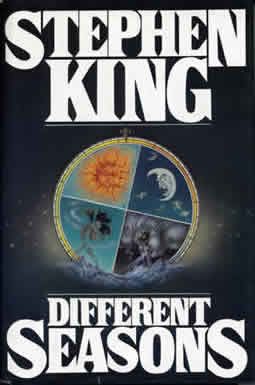 |
| 1981 |
Different Seasons (1982) is a collection of four novellas, markedly different in tone & subject, each with a journey theme. The 1st is a nonhorrific tale about an innocent man who carefully nurtures hope & devises a wily scheme to escape from prison. The 2nd concerns a boy who discards his innocence by enticing an old man to travel with him into a reawakening of long-buried evil. In the 3rd, a writer looks back on the trek he took with three friends on the brink of adolescence to find another boy's corpse. The trip becomes a character-rich rite of passage from youth to maturity. These 1st three novellas have been made into movies: "Rita Hayworth and Shawshank Redemption" into Frank Darabont's 1994 The Shawshank Redemption (available as a screenplay, a DVD & an audiocassette), "Apt Pupil" into Bryan Singer's 1998 film Apt Pupil (also released in 1998 on audiocassette), & "The Body" into Rob Reiner's Stand by Me (1986). The final novella, "Breathing Lessons," is a horror yarn told by a doctor, about a patient whose indomitable spirit keeps her baby alive under extraordinary circumstances. It's the tightest, most polished tale in the collection.--Fiona Webster
From Goodreads
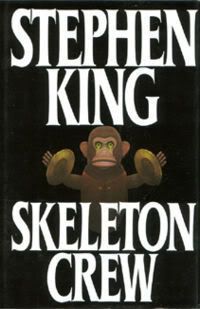 |
| 1985 |
In the introduction to Skeleton Crew (1985), his second collection of stories, King pokes fun at his penchant for "literary elephantiasis," makes scatological jokes about his muse, confesses how much money he makes (gross and net), and tells a story about getting arrested one time when he was "suffused with the sort of towering, righteous rage that only drunk undergraduates can feel." He winds up with an invitation to a scary voyage: "Grab onto my arm now. Hold tight. We are going into a number of dark places, but I think I know the way."
And he sure does. Skeleton Crew contains a superb short novel ("The Mist") that alone is worth the price of admission, plus two forgettable poems and 20 short stories on such themes as an evil toy monkey, a human-eating water slick, a machine that avenges murder, and unnatural creatures that inhabit the thick woods near Castle Rock, Maine. The short tales range from simply enjoyable to surprisingly good.
In addition to "The Mist," the real standout is "The Reach," a beautifully subtle story about a great-grandmother who was born on a small island off the coast of Maine and has lived there her whole life. She has never been across "the Reach," the body of water between island and mainland. This is the story that King fans give to their friends who don't read horror in order to show them how literate, how charming a storyteller he can be. Don't miss it. --Fiona Webster
From Goodreads
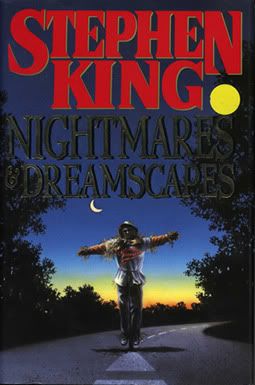 |
| 1993 |
Many people who write about horror literature maintain that mood is its most important element. Stephen King disagrees: "My deeply held conviction is that story must be paramount.... All other considerations are secondary--theme, mood, even characterization and language."
These fine stories, each written in what King calls "a burst of faith, happiness, and optimism," prove his point. The theme, mood, characters, and language vary, but throughout, a sense of story reigns supreme. Nightmares & Dreamscapes contains 20 short tales--including several never before published--plus one teleplay, one poem, and one nonfiction piece about kids and baseball that appeared in the New Yorker. The subjects include vampires, zombies, an evil toy, man-eating frogs, the burial of a Cadillac, a disembodied finger, and a wicked stepfather. The style ranges from King's well-honed horror to a Ray Bradbury-like fantasy voice to an ambitious pastiche of Raymond Chandler and Ross MacDonald. And like a compact disc with a bonus track, the book ends with a charming little tale not listed in the table of contents--a parable called "The Beggar and the Diamond."--Fiona Webster
From Goodreads
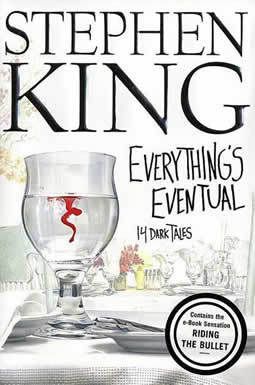 |
| 2002 |
In his introduction to Everything's Eventual, horror author extraordinaire Stephen King describes how he used a deck of playing cards to select the order in which these 14 tales of the macabre would appear. Judging by the impact of these stories, from the first words of the darkly fascinating "Autopsy Room Four" to the haunting final pages of "Luckey Quarter," one can almost believe King truly is guided by forces from beyond.
His first collection of short stories since the release of Nightmares & Dreamscapes in 1993, Everything's Eventual represents King at his most undiluted. The short story format showcases King's ability to spook readers using the most mundane settings (a yard sale) and comfortable memories (a boyhood fishing excursion). The dark tales collected here are some of King's finest, including an O. Henry Prize winner and "Riding the Bullet," published originally as an e-book and at one time expected by some to be the death knell of the physical publishing world. True to form, each of these stories draws the reader into King's slightly off-center world from the first page, developing characters and atmosphere more fully in the span of 50 pages than many authors can in a full novel.
For most rabid King fans, chief among the tales in this volume will be "The Little Sisters of Eluria," a novella that first appeared in the fantasy collection Legends, set in King's ever-expanding Dark Tower universe. In this story, set prior to the first Dark Tower volume, the reader finds Gunslinger Roland of Gilead wounded and under the care of nurses with very dubious intentions. Also included in this collection are "That Feeling, You Can Only Say What It Is in French," the story of a woman's personal hell; "1408," in which a writer of haunted tour guides finally encounters the real thing; "Everything's Eventual," the title story, about a boy with a dream job that turns out to be more of a nightmare; and "L.T.'s Theory of Pets," a story of divorce with a bloody surprise ending.
King also includes an introductory essay on the lost art of short fiction and brief explanatory notes that give the reader background on his intentions and inspirations for each story. As with any occasion when King directly addresses his dear Constant Readers, his tone is that of a camp counselor who's almost apologetic for the scare his fireside tales are about to throw into his charges, yet unwilling to soften the blow. And any campers gathered around this author's fire would be wise to heed his warnings, for when King goes bump in the night, it's never just a branch on the window. --Benjamin Reese
From Goodreads
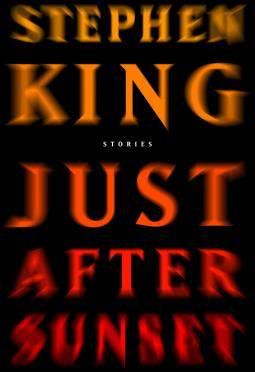 |
| 2008 |
Stephen King-who has written more than fifty books, dozens of number one New York Times bestsellers, and many unforgettable movies-delivers an astonishing collection of short stories, his first since Everything's Eventual six years ago. As guest editor of the bestselling Best American Short Stories 2007, King spent over a year reading hundreds of stories. His renewed passion for the form is evident on every page of Just After Sunset. The stories in this collection have appeared in The New Yorker, Playboy, McSweeney's, The Paris Review, Esquire and other publications.
Who but Stephen King would turn a Port-a-San into a slimy birth canal, or a roadside honky-tonk into a place for endless love? A book salesman with a grievance might pick up a mute hitchhiker, not knowing the silent man in the passenger seat listens altogether too well. Or an exercise routine on a stationary bicycle, begun to reduce bad cholesterol, might take its rider on a captivating-and then terrifying-journey. Set on a remote key in Florida, "The Gingerbread Girl" is a riveting tale featuring a young woman as vulnerable-and resourceful-as Audrey Hepburn's character in Wait Until Dark. In "Ayana," a blind girl works a miracle with a kiss and the touch of her hand. For King, the line between the living and the dead is often blurry, and the seams that hold our reality intact might tear apart at any moment. In one of the longer stories here, "N.," which recently broke new ground when it was adapted as a graphic digital entertainment, a psychiatric patient's irrational thinking might create an apocalyptic threat in the Maine countryside . . . or keep the world from falling victim to it.
Just After Sunset-call it dusk, call it twilight, it's a time when human intercourse takes on an unnatural cast, when nothing is quite as it appears, when the imagination begins to reach for shadows as they dissipate to darkness and living daylight can be scared right out of you. It's the perfect time for Stephen King.
From Goodreads







4 comments:
I used to read a lot of Stephen King in my younger days. I've turned into a bit of a wuss since though :) I don't think it's right that the price for the e-book should be the same as the hardback when it is way cheaper to produce, but I know how it is when you really don't want to have to wait to read it. I assume it was one of the books where the price was set by the publisher and not Amazon?
I really enjoyed "Night Shift" and "Everything's Eventual." So, I can't wait to read "Full Dark.
No Stars." I am courrently writing a short-story book of my own; which I hope to get published. If you enjoy short stories visit my blog: Unscripted. http://www.lingering-lightprose.blogspot.com
P.S. Great review!
I love short stories. However, I'm not a fan of Stephen King's short stories or novellas in general, although there are some that I adore. Nightmares & Dreamscapes? His best short story collection. And I did think that Different Seasons was fantastic. Usually went ends up happening when I read King's short story collections is that there will be one or two short stories in the book that I love. . . and I don't like the rest. Not that it stops me from reading. After all, it's Stephen King. I can't wait to get a copy of Full Dark, No Stars. It's on my Christmas list, but I might have to buy it, and soon.
Post a Comment